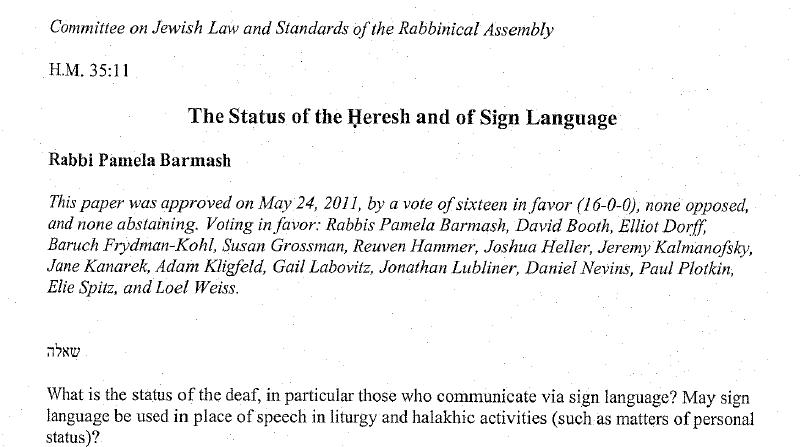 The Jewish Deaf Resource Center (JDRC) applauds the Conservative Movement’s Committee on Jewish Law and Standards (CJLS) for unanimously passing a historic Teshuvah positively impacting the lives of Jews who are deaf and hard-of-hearing. With this Teshuvah, the Conservative Jewish Movement now recognizes that individuals who communicate in sign language are equals and that the Conservative Jewish community must strive to be accessible and inclusive.
The Jewish Deaf Resource Center (JDRC) applauds the Conservative Movement’s Committee on Jewish Law and Standards (CJLS) for unanimously passing a historic Teshuvah positively impacting the lives of Jews who are deaf and hard-of-hearing. With this Teshuvah, the Conservative Jewish Movement now recognizes that individuals who communicate in sign language are equals and that the Conservative Jewish community must strive to be accessible and inclusive.
On May 24th, 2011, the CJLS passed a Teshuvah stating the following in part:
“The Committee on Jewish Law and Standards rules that the deaf who communicate via sign language and do not speak are no longer to be considered mentally incapacitated. Jews who are deaf are responsible for observing mitzvot. Our communities, synagogues, schools, and camps must strive to be welcoming and accessible, and inclusive. Sign language may be used in matters of personal status and may be used in rituals. A deaf person called to the Torah who does not speak may recite the berakhot via sign language. A deaf person may serve as a shaliah tzibbur in sign language in a minyan whose medium of communication is sign language.”
Alexis Kashar, president of JDRC said, “This is a historic moment as we deaf and hard of hearing Jews are now able to stand along with the larger Conservative Jewish community as equals. We truly appreciate Rabbi Pamela Barmash’s pioneering efforts as the author of this Teshuvah.”
The Jewish Deaf Resource Center is a national advocacy organization whose mission is to build bridges between Jews who are deaf and hard-of-hearing and the individuals and organizations which serve the Jewish community throughout North America.
Beth M. Mann, Associate Vice President of The Jewish Federations of North American (JFNA), said, “JDRC has been a magnificent partner in widening the tent of Jewish communal participation, a shared mission for both the JDRC and the JFNA. The responsum from CJLS represents a pivotal Jewish moment in our history as a people and our ever-expanding quest to provide a dynamic and magnetic community in which our people wish to participate.”
As stated by Rabbi Barmash, “This is yet another example of how Jewish law and spirituality, guided by the innovative spirit of tradition, embraces the challenges of the present.”
A copy of the full Teshuvah can be found at
rabbinicalassembly.org/sites/default/files/public/halakhah/teshuvot/2011-2020/Status%20of%20the%20Heresh6.2011.pdf
Source: Jewish Deaf Resource Center (JDRC)





